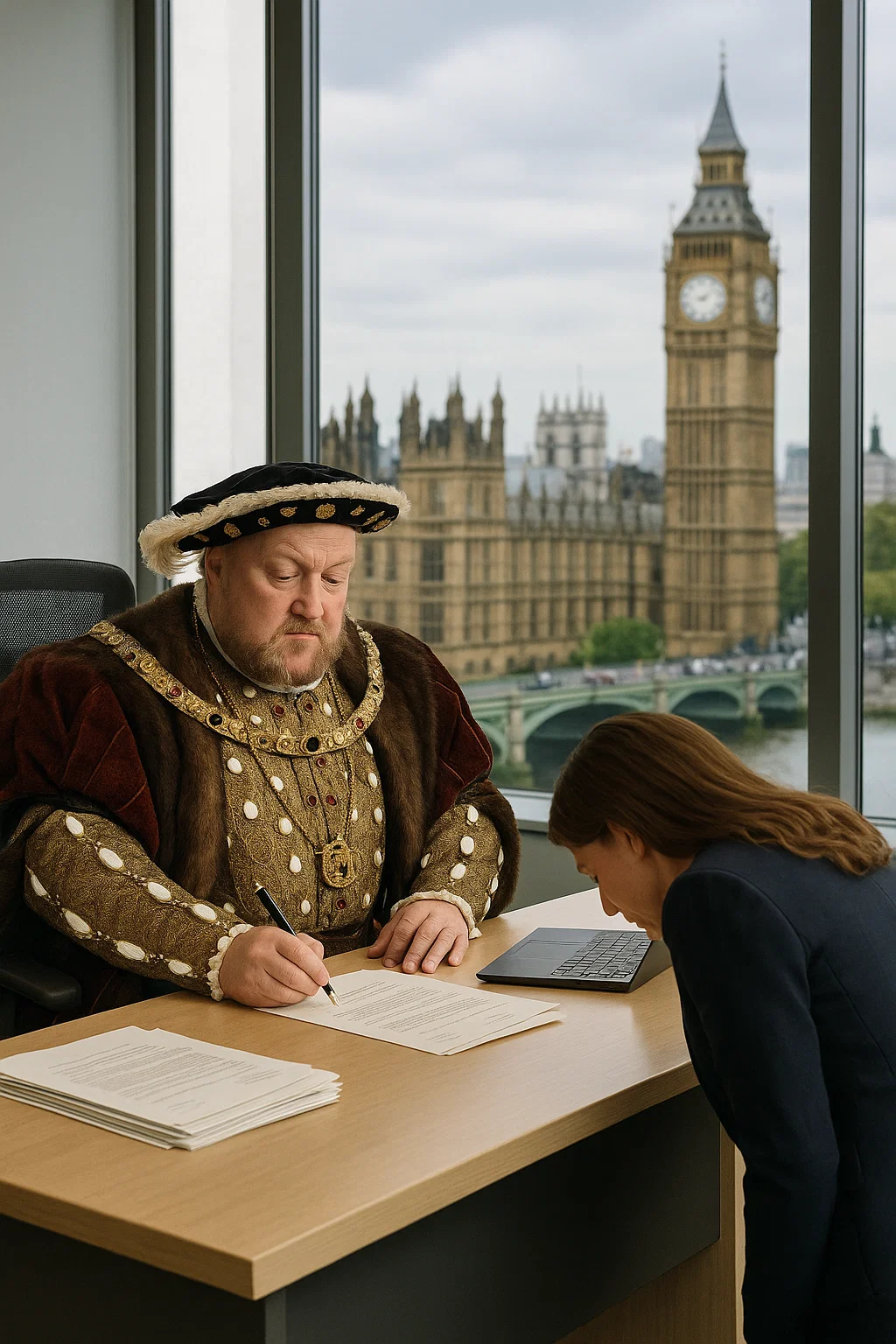Old playbook, new players.
Remember when we thought democracy had safeguards and responsible managers? These days, when leaders find themselves hamstrung by the inconvenient machinery of democratic governance, they simply reach for their bolt cutters and find alternative methods of declaring legislation.
In America, this takes the form of executive orders. In Britain, they manifest as “Henry VIII powers” – delightfully named after a monarch who responded to parliamentary resistance by simply declaring himself head of an entirely new church. Nothing demonstrates “reasonable governance” more effectively than naming a legislative loophole after a king who frequently issued warrants for the execution of opponents, including many close advisors and 2 of his wives.
This week, thanks to Liberty’s legal challenge, the UK Court of Appeal delivered a ruling that reads less like a judgement and more like a teacher confiscating scissors from a particularly destructive child. The court ruled that Suella Braverman’s anti-protest legislation – sneaked through via those very Henry VIII powers – was unlawfully created. Turns out you can’t just declare “because I said so”, Suella.
For those who missed the backstory: Our erstwhile Home Secretary, apparently inspired by the “How to Dismantle Democracy” handbook that’s been making the rounds in certain political circles, decided that parliamentary debate was simply too much bother. Why suffer the indignity of having your authoritarian impulses questioned when you could just use delegated powers to grant police “almost unlimited” authority to squash protests? It’s so much more efficient that way.
The government’s justification for these sweeping powers was the prevention of “serious disruption” – a term so infuriatingly vague it could apply to anything from an actual riot to someone wearing socks with sandals in Parliament Square. One person’s serious disruption is another’s Tuesday afternoon, after all.
This is a fundamental contempt for the democratic process. Why make the effort to persuade and justify when you can Henry VIII it and just declare new laws? Why compromise when you can circumvent? The message is clear: democratic institutions are all very well, but sometimes you just gotta to get shit done without pesky pushback.
For those of us who’ve spent our lives believing, or maybe just assuming that the government was trustworthy (yes, I am one of the old-school Gen X numpties), this is deeply unsettling. We were raised on the comforting notion that our system was imperfect but boring and that power was distributed precisely to prevent its consolidation.
So what now? Liberty’s victory offers a sliver of hope, proof that when we push back through proper channels, we can occasionally force power to retreat into its legitimate boundaries. The Court of Appeal’s ruling doesn’t just rein in police powers; it reaffirms that there are still rules, and sometimes they’re even enforced.
Pushing back can take many forms; here’s some ideas:
- Join a peaceful demonstration (no riot gear required)
- Write to your MP (they do occasionally read their mail)
- Attend local political meetings (go on…)
- Wear your politics on your sleeve (or more literally, on a T-shirt)
- Share information online (preferably fact-checked)
- Talk to people who disagree with you (without resorting to Tudor-era tactics)
These actions may seem small against the backdrop of creeping authoritarianism, but they’re not insignificant. Democracy doesn’t just die when leaders cheat, it dies when the rest of us shrug and scroll on.
The Court of Appeal’s ruling is a reminder that sometimes, just sometimes, the system can still work as intended. But it requires vigilance, persistence, and a refusal to normalise the abnormal. Because if history teaches us anything, it’s that once leaders discover they can bypass democratic inconveniences, they rarely volunteer to give those shortcuts back.
So no, you don’t have to be a revolutionary. But perhaps it’s time to be a citizen in the fullest sense – one who recognises that when leaders start acting like Henry VIII, it’s not just protesters who should be concerned. It’s everyone who values living in a democracy rather than a kingdom.
See the full story at LibertyHumanRights.org.uk

